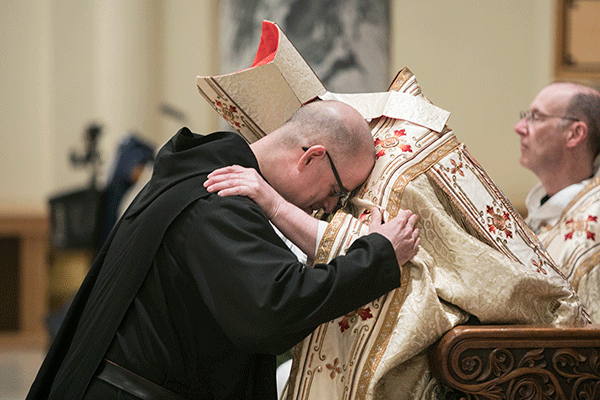Servant Leadership
Fr. Adrian Burke, OSB
Thursday, August 6, 2020

Accordingly in every instance, all are to follow the teaching of the rule, and no one shall rashly deviate from it.
Rule of St. Benedict 3:7
In Chapter 3 of the Rule of St. Benedict, we read that every monk, from the novices (beginners in monastic life) to the abbot (who holds the place of Christ in the community), is subject to the holy Rule. In short, no one is above the law.
This is the basis of Benedictine unity and peace. Before God, all of us stand in need of mercy and forgiveness, and no one is to be neglected; all are loved by God and all are called to strive for holiness together. For St. Benedict, the exercise of “authority” is a gift from God meant to protect the equal integrity of all.
The abbot exercises supreme authority in the monastery and thus serves the community for the sake of monastic order, collective harmony, and individual well-being. The abbot is answerable to God for the care of his flock, never “neglecting or treating lightly the welfare of those entrusted to him [by God] … those for whom he must give an account” (RB 2:33-34). St. Benedict’s model for good leadership is Christ, the supreme “servant-leader.”
True leaders never place themselves beyond accountability. Even the abbot cannot do whatever he wants, as if he was a “sarabaite,” that strange name St. Benedict gives to “the most detestable kind of monks,” who do “what they like to do, whatever strikes their fancy” (RB 1:8).
Good leaders walk the talk. St. Benedict sees how crucial it is for the abbot to “point out to [the monks] all that is good and holy more by example than by words.” The abbot must be “a living example” (RB 2:12), he writes. If the monks are to respect the authority of the abbot, he has to provide for the community the kind of leadership that elicits respect.
Effective leaders elicit respect from the community because good leaders respect those they lead. In the spirit of what St. Benedict calls mutual obedience, the members of the community are to care for one another, “supporting with the greatest patience one another’s weaknesses of body or behavior, and earnestly competing in obedience to one another” (RB 72:5-6). No one, insists Benedict, is allowed to “rashly deviate” from this Rule.
St. Benedict, a 6th-century abbot, has much to teach our 21st-century society about good and effective leadership. Every community, every kind of organization, requires solid leadership; leaders who hold themselves accountable, speak the truth, even difficult truth, listening carefully to those they lead.
Good leaders never think they lead by “right,” but see themselves as servants first (Mt. 20:25-28). Without good servant-leadership, the overall health of a community suffers. So, let us pray constantly for our leaders: for our abbot, all our religious leaders, and our political leaders, too, especially in these difficult and trying times.